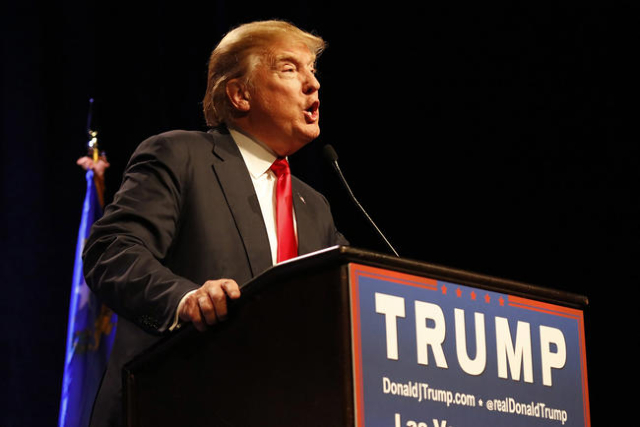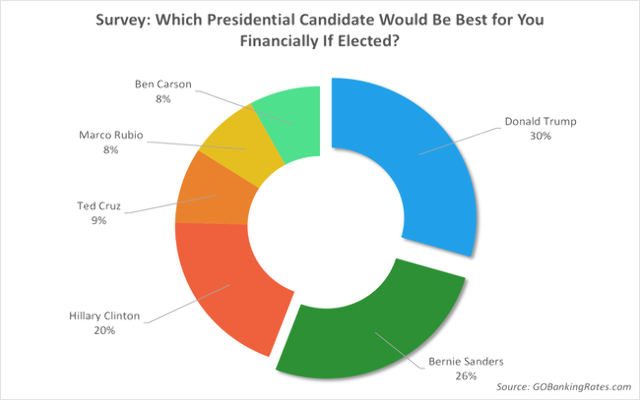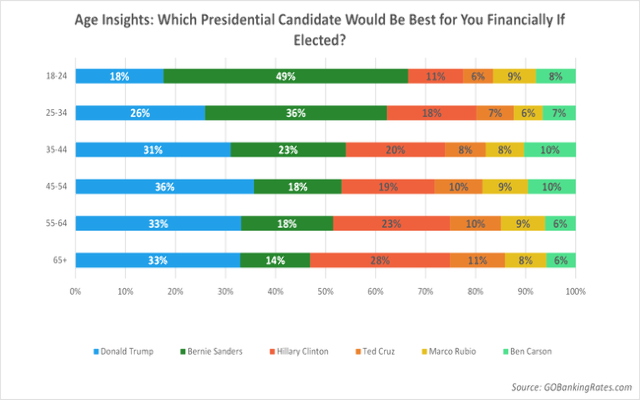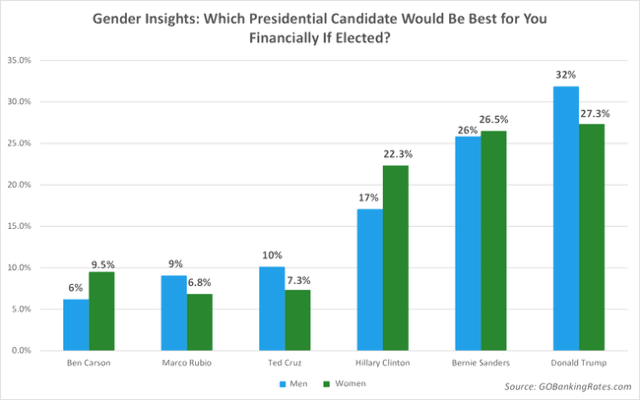1 in 3 Americans say Trump is the No. 1 presidential candidate for their money
With presidential primaries starting in February for the 2016 presidential election, the race for the Oval Office is heating up. The U.S. economy is looking up but still growing slowly, and it's a top concern for voters — 43 percent said it's their biggest consideration when deciding how to vote, according to a 2015 poll from CNN and ORC International.
The 2016 presidential candidates have taken notice and are talking plenty about the changes and new policies they would pursue, if elected, to financially help the U.S. and its citizens. To see which of the frontrunners' fiscal policies are resonating the most with voters, GOBankingRates conducted a survey that asked Americans which candidate they think will be best for their money.
Survey Findings: Who Americans View as Best for Their Money
GOBankingRates' Google Consumer Survey posed the question, "Which presidential candidate would be best for you financially?" and allowed respondents to choose one of the following answers, which were displayed randomly:
- Donald Trump
- Bernie Sanders
- Hillary Clinton
- Ted Cruz
- Marco Rubio
- Ben Carson
- None of the above
Of the 7,728 respondents polled, 37 percent selected "none of the above," indicating that their favorite candidate was not among the selection or that they had not yet concluded which candidate would be best for them financially.
Donald Trump Is Viewed as Most Favorable for Americans' Finances
For the two-thirds of total respondents who chose a candidate name from the selection, the top candidate for their finances is Trump at 29.5 percent. The biggest financial policy Trump has proposed is his tax plan, which would excuse those earning $25,000 or less — $50,000 for married couples filing jointly — from paying a federal income tax and would introduce four simpler tax brackets to replace the current seven. Trump has also focused on bringing jobs back to America, potentially by imposing tariffs on imports to the U.S. and through hard-hitting dealings with China, and he has proposed keeping the federal minimum wage without increasing it.
Bernie Sanders Is a Close Second at 26.2%
Sanders isn't far behind with 26.2 percent of respondents who selected a candidate name saying he would be best for their money. Much of Sanders' popularity is based on his passion for addressing the issue of income inequality.
Sanders' fiscal policies include proposed investments in American infrastructure to create jobs and increase productivity. He also has described plans to establish worker co-ops and strengthen unions, raise the federal minimum wage to a "living wage," close the gender pay gap, and make college more affordable. Additionally, he wants to reform taxes to build a progressive tax system based on ability to pay, according to his campaign site.
19.7% Support Hillary Clinton on Fiscal Policy
Clinton is a close third with 19.7 percent of respondents selecting her as the candidate likely to be most beneficial to their finances. Clinton's campaign site outlines her fiscal policy as "a plan to raise American incomes." It centers on investments in infrastructure and clean energy; providing tax relief for working families and smaller businesses; and funding college educations without burdening students with debt. Clinton also plans to make the economic system more "fair" by increasing profit-sharing with workers, raising minimum wage and strengthening protections for workers, and reforming taxes to cut tax loopholes for the wealthy.
Ted Cruz, Marco Rubio and Ben Carson Less Popular on Finances
The three top candidates for Americans' money received 75 percent of the responses in the poll (not counting "none of the above" responses), and the remaining three candidates combined were selected just 25 percent of the time.
Ted Cruz trailed far behind the top three picks with 8.7 percent. Cruz's fiscal policies include a proposal for a simple, flat income tax of 10 percent; scaling back regulations on businesses, which he claims will spur job growth; and enacting policies he says will stabilize the U.S. dollar.
Marco Rubio and Ben Carson tied with 7.9 percent of the responses each. Marco Rubio has proposed fiscal policies that he says will help parents and families, strengthen small businesses, empower workers, cut taxes for Americans, and strengthen and reform Social Security and Medicare.
Ben Carson's fiscal platform centers on reining in government spending and reforming taxes for individuals and businesses, which includes a flat individual income tax of 14.9 percent.
Younger Americans Favor Sanders for Their Money, Older Americans Like Trump
Age correlated strongly with how different respondents viewed how various 2016 presidential candidates could potentially impact their personal finances. Both Trump and Clinton are more popular choices among older voters, while younger Americans think Sanders is best for their money.
Older Americans Favor Candidates Who Won't Cut Social Security
For ages 45 and over, Trump is the No. 1 pick for Americans' finances, and the age range 45 to 54 is most likely to select him at 35.7 percent. Middle-aged and senior Americans are more likely to identify as Republican or politically right-leaning, according to a Gallup Poll, so support for a Republican candidate is not surprising. And of the Republican candidates included in this survey, Trump is the only one who opposes raising the retirement age for Social Security.
Although Sanders is the second pick overall, Clinton is actually the No. 2 pick for financial health among Americans 45 and over. Clinton's fiscal policies are most popular with those 65 and over, of which 28 percent named her as best for their money. Clinton has spoken out against raising the Social Security retirement age and is in favor of continuing cost-of-living adjustments that raise benefits.
Millennials Put Their Money on Sanders' Free College and $15 Minimum Wage
Sanders' widest base of support is among young people, and this trend held true in the results of this poll. Among millennials ages 18 to 34, Sanders is the top pick as the candidate who is best for Americans' money. Support for Sanders' fiscal policies is a high 48.9 percent among younger millennials (ages 18 to 24), and he's also the favorite financial choice for older millennials (ages 25 to 34) at 36.4 percent.
Sanders' fiscal policies that directly affect young Americans include his proposals to make public colleges and universities tuition free and ease interest rates on student loans, which are attractive financial plans to a generation struggling with student debt. Young Americans might also welcome Sanders' proposal to more than double the federal minimum wage from its current $7.25 to $15 an hour as 50.4 percent of those earning a minimum wage are age 24 or younger, according to the Pew Research Center.
Cruz, like Trump and Clinton, is most popular among older people. Support for Cruz's financial policies jumps about a percentage point with each increase in age bracket used for this poll, from 6 percent among young millennials (ages 18 to 24) up to 11 percent of seniors (age 65 and over).
Carson's fiscal policies are the most popular among Generation X, or respondents who fall in the age groups of 35 to 44 and 45 to 54, but he was selected less frequently by older and younger respondents.
Responses for Marco Rubio as best for their money show no significant correlation to age.
Women Favor Democrats, Men Favor Republicans for Fiscal Policy
Men and women had differing views on which 2016 presidential candidates are best for their finances. Trump is the candidate who both men and women picked most often as the best for their money, although men are 17 percent more likely than women to choose Trump. Women are also divided more closely for different candidates, with women selecting Sanders in nearly the same portion (26.5 percent) as for Trump (27.3 percent), whereas men favor Trump by a wider margin.
Overall, women are more likely to view Democratic candidates favorably in terms of fiscal policy. For both of the Democratic candidates included in the poll, women selected these candidates as best for them financially more often than men did. Clinton's fiscal policies in particular are more appealing to women than to men, with women selecting Clinton around 30 percent more often than men did. Clinton has been outspoken on women's financial issues, making promises to close the gender pay gap, fight for paid family leave and invest in affordable child care.
Support for Sanders' financial policies is nearly the same among men and women, but he is slightly more popular with women (26.5 percent to 26 percent, respectively).
Men overall are more likely to view Republican presidential candidates as favorable to their financial situations. In addition to their top pick of Trump, men also selected Cruz and Rubio in higher numbers than women did. Carson, however, is the one Republican candidate whose financial policies appeal more to a female demographic, garnering nearly 60 percent more votes in this poll from women than men.
Methodology: Through a Google Consumer Survey, GOBankingRates surveyed 7,728 respondents online from Dec. 10-16, 2015. The survey posed the question, "Which presidential candidate would be best for you financially if elected?" and offered the following six candidates as options, displayed randomly: (1) Ben Carson, (2) Hillary Clinton, (3) Ted Cruz, (4) Marco Rubio, (5) Bernie Sanders and (6) Donald Trump, along with the option to select "None of the above." The survey has a margin of error of 3 percent, and answers are representative of the U.S. online population.
From GoBankingRates.com: 1 in 3 Americans Say Trump Is the No. 1 presidential candidate for their money
Related Stories:
-2016 presidentail candidates' net worths
-Best and worst money advice from 10 presidential hopefuls
































